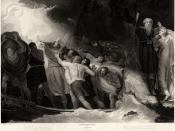Aime Cesaire's play A Tempest, written in 1969, was written in a time of increasing pressure for decolonization and black civil and national rights. Following, World War II colonial peoples set about to reinvent their futures as all the great nations were in some way disconcerted by the war. Anti-colonial leaders saw an opportunity to make nations of their colonies. Cesaire promoted decolonization throughout his life being one of the key figures for the anti-colonial movement. A Tempest is Cesaire's final expression of his political goals for the overthrow of colonialism and the establishment of unique civilizations.
As India and much of Africa became free of their titles of colony, charismatic and strong national leaders rose to lead the people. Many of these received a Western education, but remained committed to creating a new Africa for the people. Among these, notably was Leopold Sedar Senghor who became Senegal's first president when the country gained independence in 1960.
Senghor was one of the founders of the Negritude movement which aimed to embrace the traditions and roots which had made Africa unique. The main idea of negritude was a black civilization of cultural, economic, social and political values distinct from those of the Western world - different but not inferior.
These ideas of the Negritude movement resound strongly in A Tempest. Cesaire retells his own version of The Tempest by William Shakespeare in reaction to European colonialism. Cesaire transforms Shakespeare's Caliban from an ignorant savage to one who is well-spoken and able to express his mind. His drive for freedom is impeded by nothing and derived from his absolute hate of his enslavement and Prospero. His brother Ariel assumes the position of appealing to Prospero's morality, and attempts to weather his conscience with his patience and obedience. He believes negotiation...


